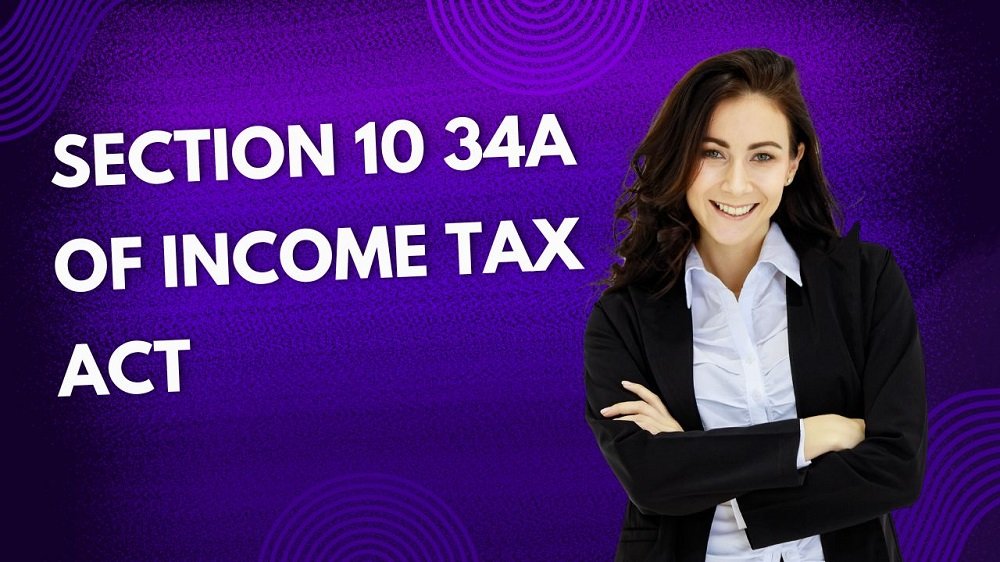Section 10 34A of Income Tax Act is a very important rule for taxpayers in India. Understanding this section is crucial for individuals and companies to make sure they follow the law and take advantage of any possible benefits. In this blog, we will explore the details of Section 10 34A. We will explain its purpose, how it affects taxpayers, and its implications. Our goal is to provide a thorough and detailed explanation using simple, conversational words to make the information easy to understand and accessible for everyone.
Overview of Section 10 34A of the Income Tax Act
Section 10 34A was added as part of the changes made to the Income Tax Act. This section deals with the tax treatment of certain types of income. Specifically, it focuses on income that comes from selling equity shares acquired under an employee stock option plan (ESOP) or employee stock purchase scheme (ESPS). The main goal of this section is to give tax relief to employees who receive shares as part of their pay package.
Key Provisions of Section 10 34A
- Exemption from Tax on Transfer of Equity Shares: Section 10 34A states that any income from selling equity shares, acquired under an ESOP or ESPS, is exempt from tax. This tax break applies if the shares are sold after a certain period from the date they were acquired.
- Specified Period: The specified period mentioned in this section is essential for getting the tax exemption. The shares must be held for a minimum period, usually defined as 12 months, from the date of acquisition. If the shares are sold before this period, the tax exemption will not apply.
- Conditions for Exemption: To qualify for the exemption under Section 10 34A, certain conditions must be met. These include:
- The shares must be listed on a recognized stock exchange.
- The transfer must be subject to securities transaction tax (STT).
- The shares should be part of an ESOP or ESPS approved by the relevant authorities.
Detailed Explanation of Employee Stock Option Plan (ESOP) and Employee Stock Purchase Scheme (ESPS)
Employee Stock Option Plan (ESOP)
An Employee Stock Option Plan (ESOP) is a benefit plan offered by companies to their employees. Under an ESOP, employees are given the option to purchase a specific number of company shares at a predetermined price, usually lower than the market value. The main objective of ESOPs is to align the interests of employees with those of shareholders by providing employees with an ownership stake in the company. This means employees can become partial owners of the company they work for, which can increase their motivation and loyalty.
Employee Stock Purchase Scheme (ESPS)
An Employee Stock Purchase Scheme (ESPS) is another type of benefit plan where employees are allowed to purchase company shares, often at a discounted price. Unlike ESOPs, where employees have the option to buy shares, under an ESPS, employees typically make regular contributions through payroll deductions to buy shares at a future date. This allows employees to invest in the company over time and benefit from any increase in the company’s share price.
Importance of Section 10 34A for Employees
Section 10 34A is particularly important for employees who receive shares under ESOPs or ESPSs. This section provides significant tax relief by exempting income from the transfer of these shares, provided certain conditions are met. This tax exemption can result in substantial savings for employees, making ESOPs and ESPSs more attractive as part of their overall compensation package. It means that employees can keep more of the money they make from selling these shares, which can be a great financial benefit.
Example Scenario
To illustrate the impact of Section 10 34A, consider an employee who receives 1,000 shares of their company under an ESOP. The shares are acquired at a price of INR 100 per share, while the market price at the time of acquisition is INR 150 per share. If the employee sells these shares after holding them for the specified period, any income arising from the sale will be exempt from tax under Section 10 34A. This means that the employee will not have to pay tax on the difference between the sale price and the acquisition price, resulting in significant tax savings. For example, if the shares are sold for INR 200 each, the employee makes a profit of INR 100 per share, which would normally be taxed. But under Section 10 34A, this profit is tax-free, leading to substantial savings.
Tax Implications and Benefits
Tax Exemption on Long-Term Capital Gains
One of the primary benefits of Section 10 34A is the exemption from tax on long-term capital gains. Long-term capital gains are the profits earned from the sale of an asset held for a longer period, typically more than 12 months. By exempting these gains from tax, Section 10 34A encourages employees to hold onto their shares for a longer duration, fostering a sense of ownership and loyalty towards the company. This tax benefit can make a big difference in the financial planning of employees, as it reduces the amount of tax they have to pay.
Impact on Tax Planning
Section 10 34A plays a crucial role in tax planning for employees. By taking advantage of the tax exemption on income from the transfer of shares, employees can effectively reduce their overall tax liability. This can be particularly beneficial for employees in higher tax brackets, as the exemption can lead to significant savings. Proper tax planning can help employees make the most of their earnings and investments, ensuring they keep more of their hard-earned money.
Encouraging Employee Participation
By providing tax incentives for holding shares acquired under ESOPs and ESPSs, Section 10 34A encourages greater employee participation in these schemes. This can result in a more motivated and engaged workforce, as employees feel more connected to the company’s success and growth. When employees have a financial stake in the company, they are more likely to work harder and contribute to its success, benefiting both the employees and the company.
Conditions and Limitations of Section 10 34A
Compliance with Securities Transaction Tax (STT)
For the tax exemption under Section 10 34A to apply, the transfer of shares must be subject to Securities Transaction Tax (STT). STT is a tax levied on transactions involving equity shares, and compliance with this requirement is essential to qualify for the exemption. This means that employees must ensure that their share transactions are properly documented and that STT is paid, which is usually handled by the stock exchange.
Holding Period Requirement
As mentioned earlier, the shares must be held for a minimum specified period, usually 12 months, from the date of acquisition. If the shares are sold before this period, the tax exemption under Section 10 34A will not apply, and the income from the sale will be subject to tax. This holding period requirement encourages long-term investment and helps employees benefit from the potential growth in the company’s share price over time.
Approval of ESOP or ESPS
The ESOP or ESPS under which the shares are acquired must be approved by the relevant authorities. This ensures that the schemes comply with regulatory requirements and are structured in a manner that aligns with the objectives of Section 10 34A. Approval of these schemes provides an additional layer of security for employees, ensuring that their investments are protected and compliant with the law.
Practical Considerations for Employees
Record-Keeping and Documentation
To take advantage of the tax exemption under Section 10 34A, it is essential for employees to maintain accurate records and documentation. This includes details of the acquisition and sale of shares, compliance with STT, and evidence of holding the shares for the specified period. Proper record-keeping ensures that employees can substantiate their claims for tax exemption and avoid any disputes with tax authorities. Good documentation practices can save employees a lot of time and trouble when it comes to filing taxes.
Consultation with Tax Professionals
Given the complexities involved in tax laws and regulations, it is advisable for employees to consult with tax professionals or financial advisors. These experts can provide guidance on the application of Section 10 34A, help with tax planning strategies, and ensure compliance with all requirements to maximize the benefits of the tax exemption. Professional advice can be invaluable in navigating the complexities of tax law and making the most of the available benefits.
Conclusion
Section 10 34A of Income Tax Act is a significant provision that offers substantial tax relief to employees receiving shares under ESOPs and ESPSs. By exempting income from the transfer of these shares, this section encourages long-term ownership and participation in the company’s success. Understanding the key provisions, conditions, and benefits of Section 10 34A is crucial for employees to effectively manage their tax liabilities and make informed decisions regarding their compensation and investments.
Also Read
- Section 271DA of the Income Tax ActThe Income Tax Act in India is a set of laws that guide how taxes are collected and managed in the country. One important part of this law is Section 271DA of the Income Tax Act, which deals with cash…
- 194E of Income Tax Act: A Comprehensive GuideThe Indian Income Tax Act, 1961, is a law that outlines how taxes should be handled in India. Within this law, there is Section 194E, which specifically deals with how taxes should be deducted on payments made to non-resident sportsmen…
- 194F of Income Tax Act: A Detailed OverviewThe Income Tax Act of 1961 is a comprehensive statute that governs the taxation of income in India. Within this act, various sections deal with specific aspects of taxation, including the obligations of taxpayers, tax rates, and deductions. Section 194F…
- Section 10 23C iiiad of Income Tax ActTax laws in India have special provisions that allow certain institutions to avoid paying taxes. Section 10 23C iiiad of the Income Tax Act is one such provision, specifically aimed at helping smaller educational institutions. It allows them to be…
- Section 10 23C iv of the Income Tax Act: A Detailed ExplanationSection 10 23C iv of the Income Tax Act, 1961, is a part of the Indian tax law that offers tax exemptions to certain organizations. This section is particularly important for institutions that work for the public good, such as…
Frequently Asked Questions
What is Section 10(34A) of the Income Tax Act?
Section 10(34A) of the Income Tax Act exempts income received from specified mutual fund units in the form of dividends. This means that the dividends you receive from certain mutual funds are not subject to income tax. The aim is to encourage investments in these mutual funds by providing a tax benefit.
Which mutual funds qualify under Section 10(34A)?
Only mutual funds that are specified and notified under Section 10(34A) qualify for this exemption. These funds are typically designated by the government to promote specific sectors or investment types. It’s important to check if your mutual fund is listed under this section to claim the tax exemption.
How does Section 10(34A) benefit investors?
Section 10(34A) benefits investors by exempting dividend income from specified mutual funds from income tax. This reduces the overall tax liability, making mutual funds an attractive investment option. By investing in these funds, investors can enjoy tax-free dividends, enhancing their returns.
Are all mutual fund dividends tax-exempt under Section 10(34A)?
No, not all mutual fund dividends are tax-exempt under Section 10(34A). Only dividends from specified mutual funds notified under this section qualify for the exemption. Investors need to verify if their mutual fund is listed to benefit from this tax relief.
Do I need to report exempt income from mutual funds in my tax return?
Yes, even though the dividend income from specified mutual funds is exempt under Section 10(34A), you still need to report this income in your tax return. This helps maintain transparency and compliance with tax laws, avoiding potential issues during tax assessments.
Can corporate entities also benefit from Section 10(34A)?
Section 10(34A) primarily benefits individual taxpayers. While corporate entities might have different tax provisions, individual investors can leverage this section to reduce their taxable income through exempt dividends from specified mutual funds.
What should I verify to claim exemption under Section 10(34A)?
To claim the exemption under Section 10(34A), you should verify that the mutual fund distributing the dividend is specified and notified under this section. You can check with your mutual fund provider or refer to official notifications to confirm eligibility.
How does Section 10(34A) impact my investment strategy?
Section 10(34A) can significantly impact your investment strategy by making specified mutual funds more attractive due to their tax-free dividend income. This can lead you to include more of these funds in your portfolio to maximize your tax benefits and overall returns.
Are there any other sections similar to 10(34A) for different incomes?
Yes, there are other sections in the Income Tax Act that provide exemptions for different types of income. For example, Section 10(34) exempts dividends from domestic companies. Each section has specific criteria and conditions for the exemption, tailored to different types of income.
How do I find out if my mutual fund is eligible under Section 10(34A)?
To find out if your mutual fund is eligible under Section 10(34A), you can consult your mutual fund provider, financial advisor, or check official government notifications. Ensuring that your mutual fund qualifies will help you claim the tax exemption on dividend income.








